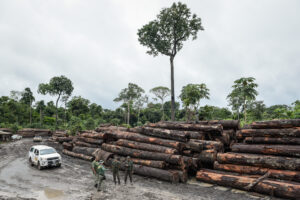The Drumbeat of Insurrection Sounds in Brazil
The violence in Brasilia was shocking, but hardly surprising. Supporters of Brazil's former President Jair Bolsonaro, storm the the National Congress building in Brasilia, Brazil, Sunday, Jan. 8, 2023. (AP Photo/Eraldo Peres)
Supporters of Brazil's former President Jair Bolsonaro, storm the the National Congress building in Brasilia, Brazil, Sunday, Jan. 8, 2023. (AP Photo/Eraldo Peres)
Brazilians could see it forming on the horizon, like a storm rolling into Guanabara Bay during the tropical summer. The signs had been telegraphed for months, in both the refusal of far-right President Jair Bolsonaro to publicly accept his narrow electoral defeat to the leftist Luiz Inácio Lula da Silva, known as Lula, in October elections, and in the seeming sympathy with which some in official positions greeted this refusal.
When the storm broke yesterday, and thousands of Bolsonaro supporters in the capital Brasilia attacked and vandalized the Palácio do Planalto (the country’s presidential office), its congressional building and its Supreme Federal in the Praça dos Três Poderes (Plaza of the Three Powers), it was the culmination of a steady drumbeat of incitement and organizing for which violence was the inevitable dénouement.
During last year’s election that brought Lula — who previously served as president from 2003 to 2010 — back to power, many saw worrying signs of collusion between the Bolsonaro camp and other entities within the government. As Bolsonaro referred to Lula — who spent more than a year in jail for alleged involvement in a corruption scheme only to be released and have his convictions annulled — as “the former prisoner” during debates, ostensibly apolitical figures such as the head of Brazil’s highway police posted calls on social media for people to vote for Bolsonaro, as reports surfaced that the force was attempting to keep pro-Lula voters from casting their ballots.
In August, during his reelection campaign, Bolsonaro reinforced his anti-democratic rhetoric and opined that “power only emanates from the people when they choose correctly.” As soon as the votes were counted, revealing a Lula victory, Bolsonaro’s supporters began to baselessly allege fraud and call for military intervention to prevent the former president from taking power.
Many have also seen at least a tacit endorsement of the drumbeat of sedition in the military’s tolerance — now for months — of the bolsonarista encampments that sprung up around military barracks in the country, where people openly called on the army to intervene to keep Lula from assuming his duly-elected office. Brazil’s new minister of justice, Flávio Dino, called the camps “incubators of terrorism” after a Bolsonaro supporter was arrested for allegedly constructing an explosive device with which he hoped to prevent Lula’s inauguration. The camps began to be dismantled on Monday after Brazi’s Supreme Court ordered their “eviction and total dissolution.”
Others voiced concern when Ibaneis Rocha, the governor of Brazil’s Federal District, of which Brasilia is a part, appointed Anderson Torres, who had served as Bolsonaro’s minister of justice and public security and who was known for his dog-like loyalty to the right-wing president, as its secretary of public security. Torres was dismissed from his role after the assault and the Brazilian financial publication Valor Econômico is now reporting that he is in the United States. Rocha himself has been suspended from office for 90 days pending investigation of the violence in the capital
Though some police bravely defended the buildings under attack yesterday, Brazil’s Revista Piauí fretted about how the attitude of many in law enforcement in the capital “oscillated between escort, moral support and fraternization with Bolsonarist criminals.” Some senators openly speculated that some of the rioters may have had police training.
Bolsonarismo has always been marked by violence. In October, Carla Zambelli, a right-wing federal deputy and Bolsonaro ally, chased a man down a São Paulo street while pointing a loaded gun at him after they got into an argument about politics. That same month, another Bolsonaro ally, former congressman Roberto Jefferson, hurled grenades and shot at police as they came to take him to prison in connection with threats he had made against a Supreme Court justice. Jefferson has frequently promoted anti-semitic and other conspiracy theories on his social media pages. Two police officers were injured in the confrontation.
“The coup plotters who promoted the destruction of public property in Brasilia are being identified and will be punished,” Lula tweeted after the attacks. World leaders were also swift to condemn the assault, with Joe Biden tweeting, “I condemn the assault on democracy and on the peaceful transfer of power in Brazil. Brazil’s democratic institutions have our full support and the will of the Brazilian people must not be undermined” and French president Emmanuel Macron tweeted that “The will of the Brazilian people and the democratic institutions must be respected!”
Many were apt to draw parallels between the Jan. 6, 2021 assault by Trump supporters on the Capitol in Washington and the violence in Brasilia (which, unlike the attack in Washington, occurred at a time when the targeted buildings were almost deserted). Indeed, Bolsonaro’s son, Eduardo Bolsonaro, a member of Brazil’s lower house of congress, is known to have discussed his father’s election loss with former Trump consigliere Stephen K. Bannon and met with Trump himself in Mar-a-Lago in November. Savvier than Trump, Bolsonaro placed himself nearly 4,000 miles away, at a resort outside of Orlando, on the day of the attacks, later in the day tweeting, “Lawful peaceful demonstrations are part of democracy. However, depredations and invasions of public buildings as occurred today, as well as those practiced by the left in 2013 and 2017, do not fall under that rule.”
Though Brazil’s democracy has weathered storms before, the outlook is uncertain, to say the least. Far different from his first term in office, the legislature that Lula must now contend with is dominated by center-right to far-right parties, with Bolsonaro’s Partido Liberal the largest party in the Chamber of Deputies. In last year’s vote, more governors allied with Bolsonaro were elected or reelected than supporters of Lula. including Claudio Castro, the governor of the state of Rio de Janeiro, the heart of Brazil’s oil industry.
Since Sunday,the vast majority of Brazilian institutions have, however, roundly rejected Sunday’s vandalism. In an editorial, Folha de S.Paulo, Brazil’s largest circulation newspaper, wrote that “perhaps [the assailants] believe that attacking concrete monuments…means some sinister conquest. In reality, they only manifest cowardice, stupidity and a herd mentality. The institutions of the rule of law, which have been strengthened for four decades, are safe.”
One hopes so.
Your support matters…Independent journalism is under threat and overshadowed by heavily funded mainstream media.
You can help level the playing field. Become a member.
Your tax-deductible contribution keeps us digging beneath the headlines to give you thought-provoking, investigative reporting and analysis that unearths what's really happening- without compromise.
Give today to support our courageous, independent journalists.






You need to be a supporter to comment.
There are currently no responses to this article.
Be the first to respond.